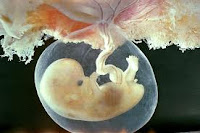According to the article below, a US appeals court on Thursday granted an Obama administration request to temporarily lift a judge's ban on federal funding of research involving human embryonic stem cells. That means the for the time being at least, they can resume work on controversial human embryonic stem cell research. More legal action is pending.
. . . June
------------------------
US resumes funding controversial stem cell research
The Economic Times:
WASHINGTON: The US government said it was resuming work on controversial human embryonic stem cell research on Friday after an appeals court ruled in its favor.
In the latest legal back-and-forth on the issue, a US appeals court on Thursday granted an Obama administration request to temporarily lift a judge's ban on federal funding of research involving human embryonic stem cells.
More legal action is pending but the National Institutes of Health said it would resume work that had been suspended. 'We are pleased with the court's interim ruling, which will allow promising stem cell research to continue while we present further arguments to the court in the weeks to come,' the NIH said in a statement.
"With the temporary stay in place, NIH has resumed intramural research and will continue its consideration of grants that were frozen by the preliminary injunction on August 23. The suspension of all grants, contracts, and applications that involve the use of human embryonic stem cells has been temporarily lifted," it added.
The three-judge panel of the appeals court said in its brief order on Thursday that it put on hold the judge's ban while it considers the merits of the administration's emergency request for a stay of his injunction. US District Judge Royce Lamberth ruled last month that the research violated U.S. law because it involved destroying human embryos.
The ruling was a setback for President Barack Obama, who had tried to expand the research. The appeals court ordered that briefs be filed by Sept 20. It then will have to decide whether its temporary administrative stay should be extended or ended.
Read on . . .
Medical Research Breakthroughs - From Stem Cell Research To Experiments In Reverse Aging
Friday, September 10, 2010
Monday, September 6, 2010
Balzan prize Won By Japanese Stem Cell Researcher
If adult cells could take on the characteristics of embryonic stem cells, then the moral issue wouldn't arise. According to the article below, that's what this Japanese researcher has discovered and it won him the Balzan Prize for biology.
. . . June
-----------------------------
Japanese stem cell researcher wins Balzan prize
COLLEEN BARRY The Associated Press Mon, Sep. 6, 2010
AP | 09/06/2010: "MILAN - A Japanese researcher who found a way to give adults cells certain characteristics of embryonic stem cells, a process scientists say could eventually lead to cures for spinal cord injuries and other ailments, has been awarded the Balzan Prize for biology.
Shinya Yamanaka's prize is one of four , two for sciences, two in humanities , awarded this year by the foundation, with the goal of highlighting new or emerging areas of research and to sustain fields of study that may have been overlooked elsewhere.
Also winning awards were Brazilian mathematician Jacob Palis, who was cited for his contributions to the theory of dynamical systems, which draws from chaos theory and the butterfly effect, or the idea that small differences can create huge changes.
The humanities prizes go to Italian historian Carlo Ginzburg, the father of microhistory, the study of the past based on a focus on the small scale, for his contributions to the study of ordinary people in Europe, and to German Manfred Bauneck for his history of the European theater.
. . . June
-----------------------------
Japanese stem cell researcher wins Balzan prize
COLLEEN BARRY The Associated Press Mon, Sep. 6, 2010
AP | 09/06/2010: "MILAN - A Japanese researcher who found a way to give adults cells certain characteristics of embryonic stem cells, a process scientists say could eventually lead to cures for spinal cord injuries and other ailments, has been awarded the Balzan Prize for biology.
Shinya Yamanaka's prize is one of four , two for sciences, two in humanities , awarded this year by the foundation, with the goal of highlighting new or emerging areas of research and to sustain fields of study that may have been overlooked elsewhere.
Also winning awards were Brazilian mathematician Jacob Palis, who was cited for his contributions to the theory of dynamical systems, which draws from chaos theory and the butterfly effect, or the idea that small differences can create huge changes.
The humanities prizes go to Italian historian Carlo Ginzburg, the father of microhistory, the study of the past based on a focus on the small scale, for his contributions to the study of ordinary people in Europe, and to German Manfred Bauneck for his history of the European theater.
Yamanaka has used its finding to treat spinal chord lesions in mice, though the process has not so far been applied in humans, said Nicole Le Douarin, an honorary professor at the College de France who has written a book on stem cells, and who presented the citation.
The process allows adult cells that have already been differentiated into, say, kidney cells or neural cells, be transformed back into cells with the characteristics of embryonic cells , a breakthrough that could provide an alternative to the controversial use of human embryos in stem cell research.
Read More
The process allows adult cells that have already been differentiated into, say, kidney cells or neural cells, be transformed back into cells with the characteristics of embryonic cells , a breakthrough that could provide an alternative to the controversial use of human embryos in stem cell research.
Read More
Subscribe to:
Comments (Atom)

